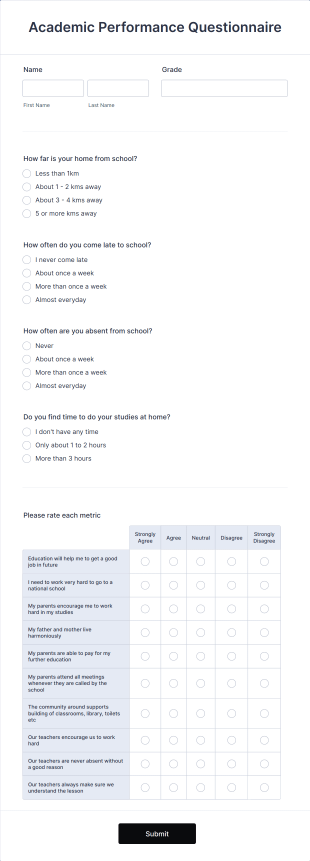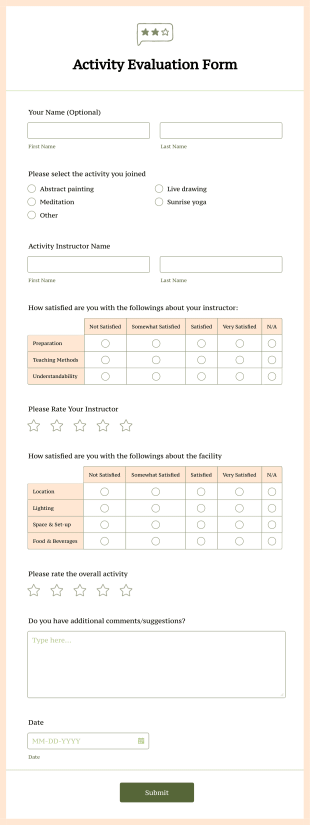Evaluation Forms
About Evaluation Forms
Evaluation forms are a great way to obtain valuable feedback and identify areas that need improvement. Whether you want to gather information on customer satisfaction, student progress, employee performance, or guest feedback, our free online evaluation forms will make it easier to collect and track evaluations. Just select one of the free templates below that best suits your needs, customize it with Jotform Form Builder, and embed it in your website or send the form link to customers, students, employees, event guests, and more.
Form users can enter their contact information, answer questions, respond to rating scales, and add comments with ease. You’ll instantly receive submitted evaluations in your secure Jotform account, making it easy for you and other colleagues to view them from any device or print for your records.
Customizing an evaluation form for your organization is a breeze with our drag-and-drop form builder. And there’s no coding necessary — just drag and drop as many form fields, survey questions, rating scales, and images as you see fit. You can even integrate your evaluation form with 100-plus popular apps — including Google Drive, Dropbox, Slack, and Airtable — to automatically send submissions to your other online accounts. Simplify your evaluation process by taking it online with our free evaluation forms — and receive the input you need to improve the way you train employees, teach students, host events, or run your business.
Frequently Asked Questions
1) How can I create an effective evaluation form?
An effective evaluation form can help your organization improve its processes, protocols, products, and practices. To ensure you have an effective evaluation form, first identify the purpose of your form — what you hope to achieve with it — along with what type of rating system and evaluation criteria you plan to use. Make sure your evaluation form is clear and concise so users can fill it out quickly without confusion. Try to use a mix of question types, including open-ended questions, to get a well-rounded evaluation.
2) What are the key components to include in an evaluation form?
Your evaluation form should first include a few fields to identify the respondent, unless you want the evaluation to be anonymous. These fields will make follow-up easy if you need to contact respondents again in the future.
Next, your evaluation form should include questions to gather the kind of feedback you’re looking for. The types of questions should vary and can include Likert scale or rating scale questions, multiple-choice questions, and open-ended questions. You can also add a narrative section that allows users to share their thoughts and perceptions in greater detail.
Finally, make sure to have a thank-you page so that respondents know you appreciate their time and effort.
3) How often should evaluation forms be administered?
This depends on a company’s needs and goals. Be careful not to overload your audience with evaluation requests — too many may cause survey fatigue, making respondents less inclined to complete your forms over time.
Generally, you should send evaluation forms any time you launch a new product, service, or event. If you offer an ongoing service or product, establish regular intervals to send out customer satisfaction or evaluation forms, such as every three to six months. Evaluation forms for performance reviews are usually shared annually or semi-annually.
Ultimately, you’ll want to space out evaluation forms to ensure you’ve had enough time to make improvements or glean new insights from previous feedback collected. This prevents you from wasting both your customers’ time and effort and your own.
4) What is the purpose of using evaluation forms?
Evaluation forms are a fantastic tool for improving your organization because they help you collect important feedback and data to inform decision making and planning. Evaluation forms are helpful for assessing the effectiveness, satisfaction, or performance of an initiative, product, service — you name it. They’re flexible and useful across every industry.
Evaluation forms administered at regular intervals assist in monitoring progress over time and providing companies with data they can track. They also encourage respondents to share their feedback and opinions honestly and without repercussions. This can create a transparent company culture by demonstrating to employees or customers how much you value their opinions.
5) What are the subtypes of evaluation forms?
There are evaluation forms for anything and everything! You can create these forms for individual purposes (such as the evaluation of teachers, peers, employees, or clients) as well as for organizations (like schools, restaurants, businesses, etc.). You can also use them to evaluate customer satisfaction when it comes to products and services, like courses or coaching. Lastly, evaluations are great for measuring the success of an event, whether it’s a concert, conference, or retreat.
6) How can I customize an evaluation form template?
Customizing an evaluation form template is simple with Jotform’s intuitive drag-and-drop form builder. Add or rearrange form fields, drop in your logo, change fonts and colors, and much more. You can adjust the theme or background of your form and even add custom CSS code to fine-tune the design — no coding required!
7) Are evaluation forms suitable for both subjective and objective assessments?
Yes, you can design evaluation forms to suit both subjective and objective assessments. If you want to collect information that’s more subjective, you can use more open-ended questions to solicit the opinions and perspectives of your audience — like when you’re asking customers to evaluate a product. For these assessments, rating scales and open-ended questions work best.
If you want to create an assessment that gathers objective information with more easily measured criteria, you can focus more on multiple-choice questions. These require respondents to use predefined answer options that are less subject to personal interpretation.
You can construct evaluation forms as subjective or objective assessments — or a mixture of both.
8) Can evaluation forms be used for self-assessment?
Yes, you can use evaluation forms for self-assessment purposes. This approach is particularly common in employee performance reviews, when employees fill out self-assessment forms for a manager to review as part of the review process. In these evaluation forms, employees can rate their own performance, abilities, and areas for improvement. They can also monitor and track their progress with periodic self-assessment forms to help them achieve longer-term goals.
9) Are evaluation forms applicable to various industries and sectors?
You can adapt evaluation forms to every kind of industry and sector! They’re useful tools in healthcare, government, businesses, schools, and much more. Evaluation forms are particularly useful for market research and collecting individual insights, which are applicable to almost any industry.
10) What types of evaluation scales or rating systems can be used in evaluation forms?
You’ll often see several types of rating systems in evaluation forms. One of the most common is the Likert scale, in which respondents indicate their level of agreement or disagreement with a particular statement. The possible answers are arranged on a scale of three or more values — for example from “agree” to “disagree.” These questions are ideal for capturing general perceptions or attitudes about a product or service.
Another type of evaluation system is the numeric rating scale, which allows users to assign a numeric value to indicate their satisfaction with a product or service. For example, they may have the option to rate a product from 1–10, depending on how much they enjoyed it. This is an easy way to quantify customer satisfaction or product performance.
Similar to the numeric rating scale, the semantic rating scale uses words instead of numbers. Users can choose from adjectives like “poor” or “excellent” to indicate their level of satisfaction.
Other possible scales are the visual analog scale (such as identifying which image best represents an opinion) and the ranking scale.
11) How can I ensure the confidentiality and anonymity of evaluation form responses?
You can confirm the confidentiality of evaluation form responses by not requiring identifying information, making the form anonymous. Also be careful not to include any questions that may inadvertently betray a user’s identity — for instance, refrain from asking a question about which department someone works in or where their office is located.
To protect confidentiality even further, make sure that all of your data related to your form is encrypted. You should also restrict access to your data and make sure security protocols are airtight to prevent potential breaches.
12) Are there any best practices for analyzing and interpreting evaluation form data?
When analyzing and interpreting data, make sure you organize your data before you begin your analysis by adding labels and addressing gaps in form submissions. You can make this step easier by setting up an evaluation form that’s clear and organized to prevent users from submitting incomplete information.
Next, identify broad trends within your data using percentages or other statistics when possible, which can help establish overall patterns before you begin cross-tabulation and segmentation into different categories to further identify trends.
It usually helps to visualize your data in graphs or tables (such as those automatically generated by Jotform Tables and Jotform Report Builder). This step also makes your data easy to share in a presentation.
Finally, if your evaluation form includes qualitative feedback, identify key insights and trends in sentiment that represent the responses at a high level.








































